- Home
- Marge Piercy
Woman on the Edge of Time Page 2
Woman on the Edge of Time Read online
Page 2
Connie asked in Spanish, “You are really a doctor?”
“Of course.” He did not look at her but replied as softly as she spoke. At his accent her eyes narrowed.
“Where are you a doctor?” She rolled on one elbow and tried to rise. “My back hurts me, it’s burned so bad. You’re Mexican.”
“What is it to you?”
“Where are you from?”
“Mexico City.”
“No. From Chihuahua, no?”
“Leave me alone, woman. You ask for trouble.”
“From you? You have enough troubles. Practicing medicine without a license. Why do you want to hurt us? My parents too came from Chihuahua.”
“Chihuahua can sink in a pit!”
“Her father’s a businessman in New Jersey. He has a big nursery business. Did that stinking pimp tell you? D’you do this thing, her father will make trouble for you, it’s the truth.”
Dolly let out a long, terrified wail that scraped on the inside of Connie’s skull. She had not heard such a desperate scream since she had been in the bughouse. Geraldo called Dr. Medias. Medias rose slowly to his feet and fumbled for a bag he had set beside the chair. Connie pulled herself up by the table leg, kicked him as hard as she could in the shin, and ran into the bedroom. She must stop them!
Dolly’s mouth was bleeding again. Blood ran over the tattered nightgown Connie had dressed her in, onto the pillow. Dolly was trying to thrash free of Geraldo, who held her pinned. He would kill her! With his treachery he would kill Dolly and her baby too. Dolly would bleed to death in that bed.
Connie seized a bottle from the corner, the wine bottle that had once contained a half gallon of California burgundy and now held dried flowers and grasses, from a rare picnic with Dolly, Nita, Luis (Dolly’s father and her brother) and his current family. With the nostalgic grasses scattering, she waved the jug and ran at Geraldo. He did not let go of Dolly quickly enough to defend himself. She smashed the wine jug right into his face. His nose flattened like a squashed bug on a windshield. He fell back against the wall, bellowing rage in no language. She raised the jug to hit him again, but her arms were caught behind her. She twisted. Someone struck her hard in the nape and she tried to turn. The fist caught her again and she went out.
She lay tied with straps to a bed, staring up at a bare bulb, shot up with meds. Thorazine? It felt worse, heavier. A massive dose. Hospital tranks hit her like a bulldozer when she had taken nothing for a long time. Prolixin? Whenever she sank into unconsciousness, she was tortured by clamps on her hips, her breasts, she was trapped in her old Chicago flat in a fire. The flames licked her skin. Her lungs filled with choking smoke. She tried and tried to pull clear of something that had fallen on her, to escape. She could not move.
Her body ached. All of her head ached. Geraldo and his carnal Slick had beaten her twice: once right after she had broken Geraldo’s nose, and again on the way to Bellevue in his car. Her ribs hurt terribly on the right side and she suspected one or two might be broken. Probably Geraldo had kicked her as she lay on the floor. In the car she had come to and he had begun punching her again in the face and chest and arms. He had beaten her until Dolly begged him to stop and began to weep and threatened to jump out of the car.
Each breath she drew stabbed her. How could she get the hospital to x-ray her for a broken rib? So far no one had heard a word she said, which of course was not unusual. Geraldo was so damned smart—bringing her to Bellevue, for instance, instead of to Met, on Ninety-sixth. Bellevue had records on her from before. He pretended she had attacked him and Dolly at Dolly’s apartment on Rivington. He would take no chance that they might not accept her as a crazy woman.
The doctor had not even interviewed her but had talked exclusively to Geraldo, exchanging only a word or two with Dolly. Geraldo had Dolly gripped by the elbow, her face still swollen. Dolly had lied. Dolly had sold her into Bellevue, and for what? For her own skin, already polluted? For the nose of her precious pimp? For the opportunity to fuck more johns? How could Dolly sit there sniveling and nod when the doctor asked if Connie had done that to her face?
Connie writhed on the bed, pinned down with just enough play to let her wriggle. They had pushed her into restraint, shot her up immediately. She had been screaming—okay! Did they think you had to be crazy to protest being locked up? Yes, they did. They said reluctance to be hospitalized was a sign of sickness, assuming you were sick, in one of these no-win circles. The last time she had not fought; she had come willingly with the caseworker, believing in her sickness. She had come humbly, rotten with self-hatred and weary of her life.
Her left calf began to cramp. She wanted to shriek with the sharp pain. She longed to knead the calf in her hands. The hard ball of muscle formed and held rigid. If she screamed they might never release her from restraint. They had forgotten her, locked her away in this broom closet to starve. She had pissed on herself. What could she do? Now she lay in her own wet stink. Cold at first, creepy cold, now warm from her body. And stinking.
She turned her head, craning to watch the slit in the door. Wide and low, like a mouth. If only she saw an attendant look in, she could signal. Her back festered between her shoulder blades, where it had been burned by the stove. The two attendants had put her neatly into restraint, the injection entering her veins like molten lead. Folding a sheet warm from the machine in the laundry room—flip, flip, bang, fold. Already the processing had begun. The attendant at check-in had held by one corner her worn red plastic purse mended with tape, held it like something dirty, a piece of garbage from the streets. Casually the woman arrayed her fragile possessions on the counter and, with a gesture like emptying an ashtray, dropped them into an envelope and locked them away.
Her purse, her keys, her scrap of brown paper on which she had been figuring April’s budget, her rent receipt, the ballpoint pen with the name of a stationery company that she had found in the subway, her black plastic comb, her old loved compact with the raised peacock figure that Claud had given her for her birthday, selecting with his sensitive fingers the “look” of the design, her dime-store red lipstick that she wore only for best against the day when it would be used up and she would lack the money for another—unless Dolly gave her a lipstick. Dolly! Who had betrayed her. Who had abandoned her. Who had sold her into bondage. At the desk her counters of identity had been taken: welfare ID, Medicaid, old library card, photos of Dolly with Nita, of Angelina as a baby, at one held by her father, Eddie, at two with herself, at three holding Claud’s hand with that grin like a canoe—the way she had drawn mouths. There were no pictures of Angelina at four, or afterward.
Through some bond of blood like a ghostly umbilical cord, could Angelina in Larchmont or Scarsdale feel her mother on the rack? Her back hurt so, her calf ached, her face throbbed, her rib stabbed her as she breathed, her shoulder was wounded where Geraldo had twisted her arm in the back seat of the car until she had thought it would snap. Her tongue was swollen and her mouth full of blood as Dolly’s had been. A foul taste: herself. The smell of her own piss rose into her nostrils. She began to weep. Then she choked on her tears and stopped in panic. She could not wipe her nose. The tears ran into her mouth. She was trussed like a holiday bird for the oven.
That doctor. What was his name? Youngish, with fine thin brown hair worn straggling, not quite long, not quite short, he kept yawning and trying to suppress the yawns so that his jaw muscles flexed strangely as he questioned Geraldo and wrote entries on a record form. Geraldo was almost demure. He had a good manner with authority, as any proper pimp should, respectful but confident. Man to man, pimp and doctor discussed her condition, while Dolly sobbed. The doctor asked her only her name and the date. First she said it was the fourteenth and then she changed it to the fifteenth, thinking it must be after midnight. She had no idea how long she had been unconscious.
“Listen to me, Doctor—I didn’t hit her! You take my niece into another room away from him and ask her if I hit her. He hit her!”
The doctor went on making notations on the form. She was a body checked into the morgue; meat registered for the scales.
She tried to tell the nurse who gave her the injection, the attendants who tied her to the stretcher, that she was innocent, that she had a broken rib, that Geraldo had beaten her. It was as if she spoke another language, that language Claud’s buddy had been learning that nobody else knew: Yoruba. They acted as if they couldn’t hear you. If you complained, they took it as a sign of sickness. “The authority of the physician is undermined if the patient presumes to make a diagnostic statement.” She had heard a doctor say that to a resident, teaching him not to listen to patients. She had been through that last time in, when she had had a toothache. It had developed into a full abscess before the nurse and the attendants stopped interpreting her complaints as part of her “pattern of illness behavior.”
Fool, poor fool she had got herself locked away again. She had jumped into the fire. Why had she done it? Why?
Yet lying in enforced contemplation, she found that clean anger glowing in her still. She hated Geraldo and it was right for her to hate him. Attacking him was different from turning her anger, her sorrow, her loss of Claud into self-hatred, into speed and downers, into booze, into wine, into seeing herself in Angelina and abusing that self born again into the dirty world. Yes, this time was different. She had struck out not at herself, not at herself in another, but at Geraldo, the enemy. She had not been wrong to try to defend Dolly, her closest one now, her blood, her almost child. How could she allow Geraldo to carve up Dolly’s body? She had smashed his nose, yes; for all her pain, she smiled as she saw that moment. She had smashed his nose and he would never look quite the same. Last time in she had accepted the doom of sickness; the weight of the heavy judgment they passed out here she had bowed to. This time she was not ashamed. She would get out fast She would be clearly competent, sane, together.
How long did she lie strapped to the bed? Day was the same as night. They had forgotten her and she would die here in her own piss. Sometimes she could not stand it anymore and she yelled as loud as she could and begged the walls to open. Moments were forever. She was mad. The drugs made her mind strange. She was caught, she was stalled. She floated trapped like an embryo in alcohol, that awful thing the Right to Life people had in that van on the street. She was caught in a moment that had fallen out of time and would never be over, never be done. She was mad. Yes, now she was crazy. How could she doubt it, lying wet in her own piss while her body screamed and the drug thickened her to lead.
Sometimes she slipped down into a hot, muggy doze and sometimes the pain from her back or her rib or her mouth tore through her sleep and she woke wild with grief and wept. “Please, please, please come. Please let me out. Someone. Please!” No response came. That was madness. To weep and cry out and curse and scream, and it was as if she had done nothing. She was dozing in that feverish half-sleep without rest or relief, when the door banged open. Two attendants came in and untied her.
She pitched forward, weak as string. She could see in their faces disgust, boredom. She smelled bad. She stank! They hauled her along the hall like a bag of garbage and they paid no attention to what she tried to say. “Please, I beg of you, listen. I was beaten before they brought me here. My rib hurts so much! Please, listen!”
“So I said to her, it’s all right for you. You don’t have to deal with these animals all day.” The woman was a husky dyed blond who spoke with a slight Middle European accent. “All you do is come in two days and play games with the better ones. It’s easy for you to pass remarks.”
“Those OT’s have it easy.” The other woman was six feet tall, hefty and black. “You better believe it. We just don’t live right, Annette. We just the muscle around here.”
“But Byrd gives me a pain. She’s no better than she ought to be. You know, she lives with a man she’s not married to. Lives with him openly in an apartment in Chelsea.”
“Mmmmm.” The black woman wore a bland, noncommittal look. “Here, into the bath with you, snooks,” she said to Connie from over her head. They began pulling her clothes off.
“I can undress myself.”
“Whew! Me-oh-my, is this one a mess? Did she jump out the window or something?”
“I was beaten up. By a pimp. Not mine,” she added quickly. “He was beating my niece. It’s him who brought me here.”
“Now what have you been into?” the black attendant wondered, shoving her into the shower like a dog to be bathed. “Some gorgeous bruises you got yourself!”
“She’ll smell better when she gets out. You wonder how they can live with themselves, never washing. But that’s part of being sick,” the blond said loftily. “Probably she’s been sleeping in the street, in doorways. I see them around.”
She wanted to scream that she washed as often as they did, that they had made her smell, made her dirty herself. But she did not dare. First, they would not listen, and second, they might hurt her. Who would care?
Because her clothes were filthy, they gave her a pair of blue pajamas three sizes too big and a robe of no particular color. Rotten luck to have been shoved into restraint on arrival. If she had simply walked up to the ward, she would have been able to keep her street clothes and more things. Here a scrap of paper, a book, a handkerchief, a nubbin of pencil, a bobby-pin were precious beyond imagining outside, irreplaceable treasures.
She found herself walking strangely, not only from the bruises: ah, the old Thorazine shuffle. She could no longer move quickly, gracefully, in spite of her plumpness. The black attendant walked her into the day room, a big bleak room between the men’s and the women’s sides of the ward, right by the locked door to the hall and the elevators. She looked around slowly. She caught sight of a clock on the way in and she knew it was eleven in the morning. She was not hungry although she had not eaten for a long time. The drug killed her appetite so that she felt hollow, weak, but not hungry. The rib stabbed her. She felt feverish and might be. Nothing she could do. Her only hope was to catch a doctor as he made his flight through the ward or to persuade one of the attendants that she really needed medical help. Then the attendant would tell the doctor. It would take days to reach that kind of relationship with an attendant, and in the meantime she could die.
How hot the ward was. Steam heat from the old radiators turned on full blast. She fingered the plastic identification bracelet sealed on her wrist. Women in street clothes or the hospital clothes issued to them were sitting vacantly along the walls or staring at the television set placed up on a shelf where no one could reach it to change the station or alter the volume level. It was less crowded than when she had been in last, markedly so. Just opposite her, two old women were chatting animatedly in strong Brooklyn Jewish accents, like two gossips on a park bench instead of two madwomen on a plastic bench in a mental hospital. But they might only be elderly and not mad. At their feet a young girl lay motionless with her hands over her face, like a pet dog snoozing. There were many less old women this time. Was there a new waste-basket for the old?
Four Puerto Rican men were playing dominoes with bits of paper at a card table in a slow motion brought on by all of them being heavily drugged, like everybody else. The game seemed to occur under water. A child, a boy of eight or nine, sat near them picking his nose in the same kind of slow motion with such a look of blank despair on his small face she had to turn away. Most of the women were sitting on the plastic chairs that came in ranks of four against the wall, but there were more women than chairs. Though some were old, some children, some black, some brown, some white, they all looked more or less alike and seemed to wear a common expression. She knew that in a short while this ward, like every other she had been on, would be peopled by strong personalities, a web of romances and feuds and strategies for survival. She felt weary in advance. Who needed to be set down in this desolate limbo to survive somehow in the teeth of the odds? She had had enough troubles already, enough!
“Lunch
, ladies. Lunch. Line up now! Come on, get your asses moving, ladies!” The dining room was around a bend in the corridor in the same ward. Back and forth they went, back and forth in the confined space from doorless bathroom to dining room to seclusion (called treatment rooms here) to the dormitories to the day room.
Lunch was a gray stew and an institutional salad of celery and raisins in orange Jell-O. The food had no flavor except the sweet of the Jell-O and she had to eat it all with a plastic spoon. At least the food did not need chewing in her bloody mouth. The objects in the stew were mushy, bits of soft flotsam and jetsam in lukewarm glue. She tried to think about how to get out of here, but her mind was mud.
Lunch was over in fifteen minutes and then they were back in the day room, milling around to line up for medication. She needed her wits to plot how she would get out of here. The effects of the shot had not worn off. Then she held her face rigid when she saw the paper cup with the pills. Gracias, gracias. A pill was easily dealt with, unlike the liquid you had to swallow at once. She slipped it under her tongue, swallowed the water, and sat down on an orange chair. It did not do to head too quickly for the bathroom to spit out the pill. She kept it under her tongue till the coating wore off and she began to taste the bitter drug.
Visiting hour came in midafternoon. Hope stabbed her when the attendant came to say she had a visitor. Dolly!
Dolly was heavily made up. She was not wearing her fur-collared coat but her old red belted coat Connie remembered from the year when Dolly was married and carrying Nita.
“Dolly, get me out of here!”
“Honey, I can’t just yet. Be a little patient. By the middle of next week.”

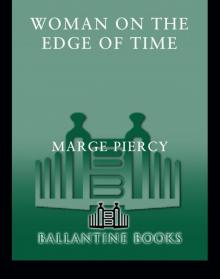 Woman on the Edge of Time
Woman on the Edge of Time The Cost of Lunch, Etc.: Short Stories
The Cost of Lunch, Etc.: Short Stories Made in Detroit: Poems
Made in Detroit: Poems Sleeping With Cats
Sleeping With Cats Moon Is Always Female
Moon Is Always Female The Longings of Women
The Longings of Women Circles on the Water
Circles on the Water Summer People
Summer People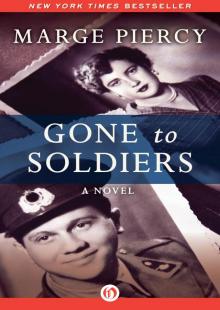 Gone to Soldiers: A Novel
Gone to Soldiers: A Novel The Hunger Moon: New and Selected Poems, 1980-2010
The Hunger Moon: New and Selected Poems, 1980-2010 Vida
Vida Fly Away Home
Fly Away Home He, She and It
He, She and It So You Want to Write
So You Want to Write Small Changes
Small Changes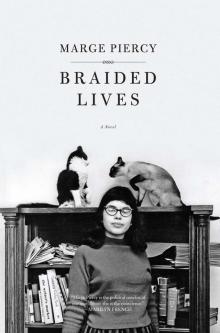 Braided Lives
Braided Lives Lord Valentine's Castle
Lord Valentine's Castle Dance the Eagle to Sleep
Dance the Eagle to Sleep City of Darkness, City of Light
City of Darkness, City of Light The High Cost of Living: A Novel
The High Cost of Living: A Novel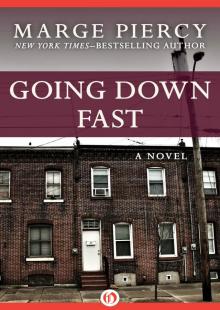 Going Down Fast: A Novel
Going Down Fast: A Novel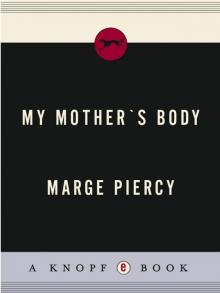 My Mother's Body
My Mother's Body Storm Tide
Storm Tide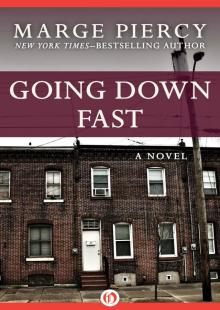 Going Down Fast
Going Down Fast The Third Child
The Third Child The Hunger Moon
The Hunger Moon The Cost of Lunch, Etc.
The Cost of Lunch, Etc. Sex Wars
Sex Wars The High Cost of Living
The High Cost of Living Made in Detroit
Made in Detroit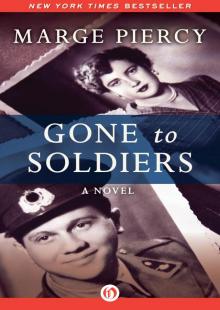 Gone to Soldiers
Gone to Soldiers